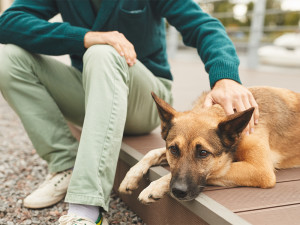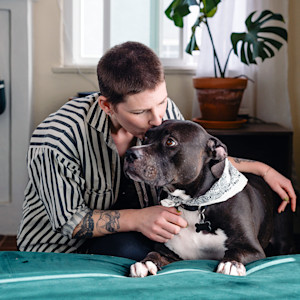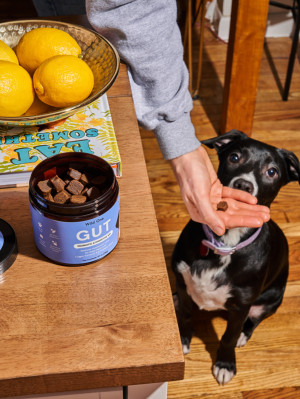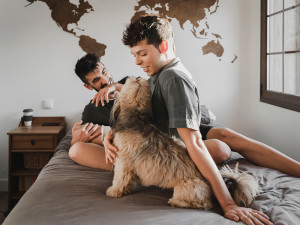What Can You Give Your Dog for Constipation?
Here are some ways to get things moving again.

Share Article
In This Article:
How to Know if Your Dog Is Constipated Causes and Symptoms of Dog Constipation Dog Constipation Home Remedies Complications of Untreated Constipation When to See a Vet
Constipation can happen to the best of us from time to time. Just as with people, mild constipation for a day or two may occur in our pups, too. Thankfully, some at-home remedies can help. They are inexpensive and natural — and you’ll have many of them at home already.
Read on to learn more about common causes of constipation in dogs, what you can do to help, and when it’s time to contact your veterinarian.
How to know if your dog is constipated
Constipation is the difficulty or inability to pass stool. Symptoms of constipation can include passing stools less frequently, defecating smaller or hard and dry stools, straining to defecate (aka staying in a defecating posture for a long time with little-to-no stool production), or vocalizing when defecating (suggesting pain or discomfort).

Many pet parents mistake diarrhea for constipation, because dogs who experience diarrhea may strain after passing loose stools. This is a little different, so your dog’s history is particularly important here. If your dog is passing stool less often than normal or showing any of the signs listed above, it may be time to consider some at-home remedies — or plan a visit to your veterinarian if they don’t help.
Causes and symptoms of dog constipation
Occasional constipation, or difficulty in passing normal stools, can be normal from time to time in dogs and puppies. Older dogs tend to be more susceptible to constipation, but it can happen at any age. Constipation (and indicators mistaken for constipation) can occur for many reasons, and some are a bit more concerning than others.
Swallowing a non-food item
By far the most common cause of constipation is ingesting something a dog shouldn’t have. This may include a foreign object, which can be hard or impossible to pass (like socks, underwear, grass, sand, plastic, toy pieces or stuffing, or feminine sanitary products). If you see your dog ingest any of these items, or if you suspect something is missing — especially if they are experiencing signs of constipation, vomiting, or appetite loss — contact your veterinarian immediately.
Hydration issues
Additional causes of constipation can include dehydration, or not enough water intake. This can be especially true in dogs who only eat dry kibble and are not great at drinking water. Adding a small amount of water to your dog’s kibble, or feeding a mixed wet and dry diet may help prevent this.
Not enough exercise
Lack of exercise can cause ileus, or the slowing down of gastrointestinal movements. This can lead to gas, bloating, and constipation. Regular walks can help regulate your dog’s metabolism and keep them defecating regularly.
A bad diet
Eating an unbalanced diet, especially one that does not have enough fiber, is a common reason dogs may experience constipation. Fiber is an essential nutrient in your dog’s diet, which can help with digestion and regular bowel movements.
Stress
Stress may play a role in your dog’s bowel movements, either causing diarrhea or a refusal to defecate, the latter of which is sometimes mistaken for constipation. Consider talking to your veterinarian before anticipated changes in your dog’s routine, which may help mitigate some of these issues before they happen.
Matted hair
Breeds of dogs with longer hair, in particular, can cause a blockage of your dog’s anus and subsequent “pseudo-constipation.” This will result in signs similar to constipation, because the stool cannot pass through mats of hair or fecal material, thus causing a plug. To prevent this, ensure that dogs with longer hair are groomed regularly, and that the hair around their anus is trimmed.
Medical reasons
Some more serious causes of constipation can include prostate enlargement, masses or tumors, or anal gland disease/pain. Some diseases can cause a slowing of the GI tract, such as an underactive thyroid gland (hypothyroidism) or kidney disease. If your dog is showing signs of constipation or not defecating for more than two to three days, contact your veterinarian immediately.
Dog constipation home remedies
Increase your dog’s water intake
This can be done by adding water fountains to your home or ice cubes to your dog’s water. You can also add water to their food or feed them a mixture of canned and dry food. If your dog can tolerate poultry, adding a splash of low-sodium chicken or turkey broth to their water might encourage them to drink more. Just make sure there are no onions, garlic, or other toxic foods in the ingredients.
Take them for walks
Regular exercise can help promote regular bowel movements and prevent gas, bloating, or constipation.
Give your dog probiotics
Probiotics can provide your dog with a healthy dose of good gut bacteria. This is frequently used in dogs who experience diarrhea or soft stools, but might also be beneficial in dogs that experience constipation.
Give your dog fiber
Pumpkin puree is an excellent source of fiber. Stock up on cans, since they last for a long time and can be used as-is or frozen into molds for a healthy treat during warmer weather. A tablespoon is all you need, because adding too much fiber to their diet could actually worsen constipation. Make sure pumpkin is the only ingredient in the can — and avoid pumpkin pie filling, which contains sugar and spices that can be bad for your dog.
Check your dog’s butt
Ensure dogs with longer hair are getting groomed frequently to avoid matted hair from “blocking the exit.” Additionally, make sure there are no visible masses or bleeding that would warrant a more immediate vet visit.
Give them coconut oil
Coconut oil can help soften stools and allow dogs to pass them more easily. Just a teaspoon is all you need, mixed right into their food. It’s also great for their coat and tolerated by most dogs.
Canned dog food
Canned dog food contains a higher moisture content than dry kibble, and might help aid with water intake and possible constipation. You can feed your dog exclusively canned food, or mix it with the kibble. Most dry kibble also has a canned option, so that you are not changing their diet too suddenly (which may result in diarrhea or vomiting). In general, it is recommended to phase in any diet changes over a few days.
Complications of untreated constipation
Aside from pain and discomfort, constipation for more than two to three days that is not responsive to at-home remedies should be investigated by a veterinarian. Constipation can be a serious or life-threatening problem, depending on the underlying cause. Left untreated, it can lead to megacolonopens in new tab, or an unnatural enlargement of the colon that may require surgery. Thankfully, if caught and addressed early, many cases of constipation can be treated with one vet visit or on an outpatient basis.
When to see a vet
Consult with a veterinarian if your dog is showing signs of constipation for more than two to three days and is not responsive to at-home remedies, or if the constipation is accompanied by other symptoms such as vomiting or a decreased appetite. Your vet may recommend diagnostics such as blood testing to look for an underlying illness, or an X-ray to determine the extent of the constipation. Treatments may include fluid under the skin or intravenously to help battle dehydration, an enema, or prescription medications to help pass stools and prevent worsening.
FAQs
Can you give a dog laxatives?
Although some dogs may be able to tolerate laxatives, this should only be done under the close supervision of a veterinarian. Not all laxatives are safe for use in dogs, and some may cause serious side effects.
Can you give a dog an enema?
Enemas should only be given by trained veterinary staff. Some dogs tolerate enemas well, while others will require a light sedative to administer it safely and without over-stressing the dog. Additionally, serious and potential side effects can occur if enemas are not administered appropriately, so best to leave it to the professionals.
How long can a dog go without pooping?
Dogs can go up to 48 hours without having a bowel movement without concern, although most healthy dogs defecate daily. If your dog regularly goes more than a day without passing stool, it is best to talk to your veterinarian to ensure no underlying issues are causing this.
What human medicine can I give my dog for constipation?
Although some human medications are used for canine constipation, this should be done under the close supervision and direction of a veterinarian. Certain drugs used for constipation are not safe for dogs. It is best to stick to the above natural remedies for constipation in dogs, and contact your veterinarian if these are not effective.

Dr. Gabrielle Fadl, DVM
After graduating from Kansas State University College of Veterinary Medicine, Dr. Fadl returned to the New York area to pursue a one-year rotating internship and has been working in general practice since. Dr. Fadl loves working in the pet space to foster the powerful human-animal bond. She hopes to continually learn and grow to practice the best quality medicine. Her motto is “Keep calm and try to take it as it comes.”
Related articles
![feeding black dog rice water to help relieve diarrhea]()
Vet-Approved Diarrhea Treatments
Shudder. It happens to all of us.
![Woman kisses her black pit bull dog on the head.]()
What Can I Give My Dog for an Upset Stomach?
It stinks to see them uncomfortable. Here’s what you can do.
![A black dog with a tilted head looks attentively at the camera while sitting in grass.]()
Is My Dog’s Poop Normal?
From bloody poop to diarrhea—all your dog’s poop problems explained.
![Black dog sitting beneath a table being fed a Wild One GUT supplement]()
Best Probiotics for Dogs
Your pup should keep these in their medicine cabinet.
![Same sex couple with their dog lying on the bed laughing at his farts]()
Why Do Dogs Fart? Causes and Remedies for Dog Flatulence
Expert solutions for your pup’s unfortunate flatulence.






